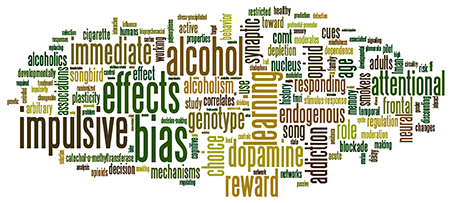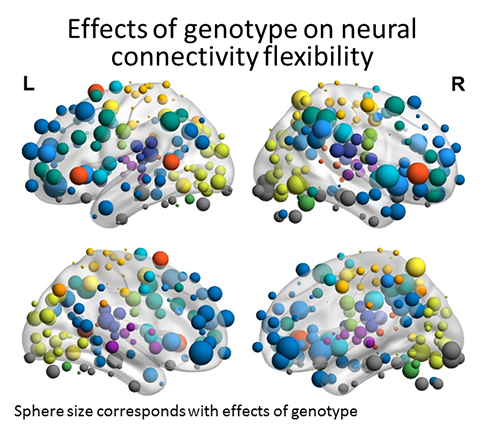The brain is the basis for behaviors, both normal and pathological. In recent decades, the use of functional magnetic resonance imaging in behavioral research has led to rapid advances in our knowledge of the functional organization of the brain and, in particular, how alterations in brain organization affect behavior. The application of human neuroimaging techniques to the study of addictive behaviors represents a promising avenue for guiding future treatment strategies for drug and alcohol use disorders.
 In Dr. Charlotte Boettiger’s laboratory, postdoctoral fellow Dr. Amanda Elton focuses on examining intermediate phenotypes of addiction using fMRI technology. In a recent study, members of the Boettiger lab scanned 95 healthy participants while they performed a computerized “delay discounting” task in which they made selections between smaller, immediate rewards and larger, delayed rewards. Dr. Elton investigated which brain networks were correlated with individual differences in subjects’ bias for immediate rewards, a form of decision-making impulsivity implicated in addiction. Activity during decision-making in a temporal lobe network predicted more impulsive choices whereas activity in a frontoparietal-striatal network predicted less impulsive choices. Additionally, activity in these two networks was inversely related, and their relative activity predicted individual decision-making behavior, which suggested that impulsive decisions may be related to disrupted interactions between these two networks (Elton et al., J Cogn Neurosci, 2017).
In Dr. Charlotte Boettiger’s laboratory, postdoctoral fellow Dr. Amanda Elton focuses on examining intermediate phenotypes of addiction using fMRI technology. In a recent study, members of the Boettiger lab scanned 95 healthy participants while they performed a computerized “delay discounting” task in which they made selections between smaller, immediate rewards and larger, delayed rewards. Dr. Elton investigated which brain networks were correlated with individual differences in subjects’ bias for immediate rewards, a form of decision-making impulsivity implicated in addiction. Activity during decision-making in a temporal lobe network predicted more impulsive choices whereas activity in a frontoparietal-striatal network predicted less impulsive choices. Additionally, activity in these two networks was inversely related, and their relative activity predicted individual decision-making behavior, which suggested that impulsive decisions may be related to disrupted interactions between these two networks (Elton et al., J Cogn Neurosci, 2017).
 In a second study, Dr. Elton investigated how a polymorphism of the catechol-O-methyltransferase (COMT) gene, associated with variations in dopamine levels in the prefrontal cortex, is related to individual differences in the flexibility of brain functional connections. This polymorphism is of particular interest due to its potential role in addiction and its association with behavioral performance on the delay discounting task. Dr. Elton found that, in male participants, genotypes coding for higher levels of dopamine were associated with greater ability to flexibly reorganize neural connections in response to task changes. In contrast, females, who generally have less COMT activity than males, this relationship demonstrated inverted-U-shaped effects in many brain regions.
In a second study, Dr. Elton investigated how a polymorphism of the catechol-O-methyltransferase (COMT) gene, associated with variations in dopamine levels in the prefrontal cortex, is related to individual differences in the flexibility of brain functional connections. This polymorphism is of particular interest due to its potential role in addiction and its association with behavioral performance on the delay discounting task. Dr. Elton found that, in male participants, genotypes coding for higher levels of dopamine were associated with greater ability to flexibly reorganize neural connections in response to task changes. In contrast, females, who generally have less COMT activity than males, this relationship demonstrated inverted-U-shaped effects in many brain regions.
Furthermore, in both sexes, the flexibility of neural connections in several brain networks mediated the relationship between genotype and impulsive choices on the delay discounting task. Diminished brain flexibility related to COMT genotype may serve as an endophenotype for disorders of impulsivity such as addiction.
In an ongoing study, Dr. Elton is collecting fMRI data in a repeated-measures design to examine the effects of naltrexone, an FDA-approved pharmacologic treatment for alcoholism, versus a placebo pill on brain functional connectivity related to attentional bias towards alcohol and reward cues. In that study, Dr. Elton and her Boettiger lab team are recruiting approximately 50 healthy adult males to investigate how heavy, binge patterns of alcohol use affect neural circuitry related to attentional bias and how these functional connections are modified by naltrexone.

Dr. Boettiger is a Professor in the Behavioral and Integrative Neuroscience Program within the Department of Psychology and Neuroscience at UNC Chapel Hill. She also works closely with the Biomedical Research Imaging Center, the Curriculum of Neuroscience, and the Bowles Center for Alcohol Studies. Learn more about the Boettiger Lab.

